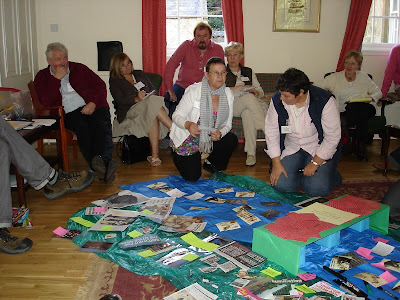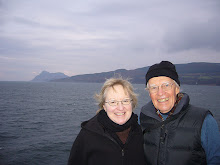
In the year 2000, a report was published for Parliament by Lord Parekh with the title, "The Future of Multi-Etnic Britain." He writes, "Britain is a recent creation and colonialism and empire were integral to its making." That's the equivalent of saying in the U.S. that we are what we are as a nation because of the historic and essential role of our minorities. I take this to mean here in the U.K that the peope from India and Pakistan and many other countries of the Commonweath are not in any sense "second class" or "outsiders," but are an essential part of the fiber that makes up England and Scotland and the other areas of the British Isles, just as much as the Anglos.
The Pakistanis, often wearing shalwar kameez -- clothes that are common in Pakistan, are an obvious ethnic minority in Glasgow. Most are Muslim. They make up forty percent of the population in an area called Pollockshields, and almost that many in another section of Glasgow, with a scattering throughout the city. Muslims are the largest non-Christian group in the city.
To embrace the Muslim community and include them in the services we provide, the Transformation Team has employed Atta Yaqub -- a young, energetic second-generation Pakistani. Atta has been a community activist for the past five years focusing on youth -- working as a volunteer with the Youth Counselling Services Agency, with particular concern for the drug and alcohol problems among Muslim and other minority young people.
As in the U.S., the media often describes the economy here as brisk, but below the radar are large sections of the population facing a very shaky and uncertain future. Unemployment is high; entry level jobs are rare and poorly paid. The excitement of violence sometimes substitutes for the possibility of an empty future that many young people face. As Atta says, "Young people from a Muslim background face identity issues. They are trying to be Pakistani, Muslim, western and Scottish all at the same time, and it's a hard formula to balance." As an active football (soccer) coach, he has helped organize sports leagues and events for the ethnic minority youth as a way for them to develop a healthy self-esteem and get engaged with diversionary activities.
To begin his community work with the Transformation Team, Atta has been working with Imams of various Glasgow mosques as well as leaders of other faith-based groups, asking them to consider developing programs in their local neighborhoods to which the Transformation Team would then bring their expertise and resources. He has been getting enthusiastic respoonses.
It doesn't hurt that Atta played the lead role in an acclaimed film, Ae Fond Kiss, and is well known throughout the land. There have been other roles as well, but he is not tempted by a full-time career under the bright lights. As he says, "[Life is] about having a sense of belonging to a place and I feel connected to the people I'm working with, whether I know them or not... My name, in Arabic, means being charitable, to give someone something." His goal is to "give back" to the community in view of all that he has received in his life.
What a joy to have Atta as a deeply empathetic and optimistic colleague and friend!





.jpg)


.jpg)

 The photograph shows Gayle Irvin, Martin Johnstone and Paul Chapman
The photograph shows Gayle Irvin, Martin Johnstone and Paul Chapman